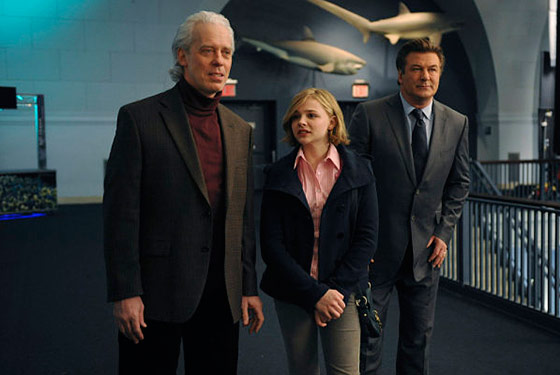
ThereÔÇÖs a lot I donÔÇÖt know about how to become the first female head writer in the history of SNL, then parlaying that experience into running and starring in a beloved, consistently crackerjack network sitcom. But I imagine it involves being around a bunch of dudes a whole lot of the time. I also imagine that oneÔÇÖs subsequent elevation to feminist icon might bring with it some complicated feelings. Tina Fey can air some of her grievances and misgivings and insecurities about spending her babymaking years at the helm of a successful comedy show in the pages of The New Yorker, but she also has 30 Rock itself, a show that was famously forced to recast FeyÔÇÖs longtime collaborator Rachel Dratch with the less Rachel DratchÔÇôlooking Jane Krakowski. Watching Fey wrestle with the specter of spinsterhood and loserdom is funny; watching her wrestle with frustration, exasperation, and maybe a little guilt born from gender politics is just plain fascinating.
After TGS is taken to task by the blog JoanOfSnark.com (tagline: Perhaps correct, definitely exhausting) for allegedly hating women (read: Jezebel v. The Daily Show) thanks to an unfortunate run of ÔÇ£Oh my period!ÔÇØ sketches. Liz, who remembers that TGS was originally called The Girlie Show before some ÔÇö ahem ÔÇö unwanted network interference, asks Jack if she can hire squeaky-voiced, pneumatic comic Abby Flynn as a guest writer during TracyÔÇÖs continued sabbatical. Jack refuses until getting a good look at AbbyÔÇÖs hot mouth. Liz thinks itÔÇÖs important for the show to seem supportive of women, while Jack thinks the gesture is futile and doomed: ÔÇ£Female jealousy is an evolutionary fact, Lemon. If you try and breed it out of them, you wind up with a lesbian with hip dysplasia.ÔÇØ And besides, Jack has other pressing concerns. Just as Devin Banks was his rival in the race to become Don GeissÔÇÖs successor, Jack has a new nemesis as he plots a path to Kabletown CEO Hank HooperÔÇÖs seat: HooperÔÇÖs 14-year-old granddaughter, Kaylie. All Jack needs to do is make sure the girl develops interests other than television, business, and especially the television business.
Girl coming! To prepare for the arrival of their sexy new co-worker, the writers invent new personalities for themselves: Frank is a rich guy, Toofer a bad boy, and Lutz a Brit. (ÔÇ£Sir Ian McKellen? That guy must be knee-deep in boob!ÔÇØ) Jenna, however, is mortified ÔÇö the show already has a ditzy blonde given to baby talk. Liz urges Abby to drop the act and use her real voice, but Abby insists sheÔÇÖs just being herself, even as she tries to indulge a homeless guy who wants to see her make out with Liz. Even though hiring Abby was meant to address some perceived slight toward women, the solution ÔÇö the embodiment of every self-respecting womanÔÇÖs nightmare of a male fantasy ÔÇö not only doesnÔÇÖt address the flaw, it shines an even brighter light on how backwards LizÔÇÖs show and crew are. (Blame the tax breaks for hiring sex offenders.)
Of course, its discovered that Abby Flynn is really Abby Grossman (kinda  bagel-y), a husky-voiced, brainy comic not unlike Sarah Silverman, and Liz confronts her with the evidence in front of the writing staff. Abby is horrified, not because her ruse is up, but because the ruse was meant to protect her from an abusive ex-boyfriend who was electrocuted while watching Sleeping With the Enemy. And heres where it falls apart a little bit. Abby gets a few good parting shots in, such as suggesting that Tinas  I mean, Lizs  trademark glasses are no less an affectation signifiying sexiness for some men than a blonde wig and giant breasts are for others. Not that there should be any sort of answers here, and Lord knows it was challenging enough to raise so many questions, but if Fey catches any guff this morning, its going to be over the fact that a smart, tightly wound meditation on the treatment and depiction of women in comedy (tackled previously in season one during Jennas ill-fated Maxim shoot) winds up hinging on some casually dispensed-with domestic abuse and a Gwyneths-head-in-a-box gag. Or maybe thats the point? Like Liz, I cant even tell anymore.
It is fitting that an episode devoted to the pressures and pitfalls of female empowerment is absolutely dominated by a 14-year-old girl. Chloe Moretz doesnÔÇÖt merely hold her own next to Alec Baldwin when Kaylie is confronted by Jack outside her school, she becomes instantly believable as someone who could outflank and outwit a self-styled Hercules/Highlander/God. She outÔÇôWill Arnetts Will Arnett and was born the year The Edge came out. Banks and Cathy Geiss are sorely missed as foils, but this couldnÔÇÖt be a more compelling replacement. Jack thinks heÔÇÖs helping the young girl pursue a life in marine biology by giving her a guided tour of the Museum of Natural History, but all heÔÇÖs doing is triggering his own repressed childhood dreams, which didnÔÇÖt involve wearing suits and going to meetings. ItÔÇÖs great work by Baldwin, as always, and even if the payoff that this was all KaylieÔÇÖs manipulation at work isnÔÇÖt totally shocking, itÔÇÖs well-earned. Or, as Jack himself seethes at his new frenemy: Well played.

